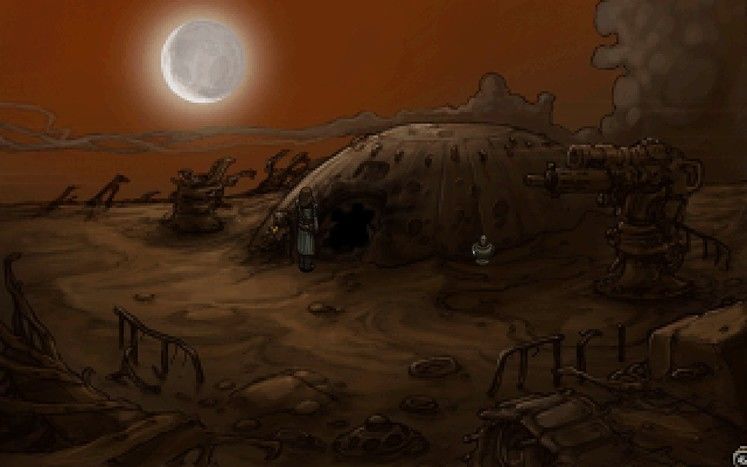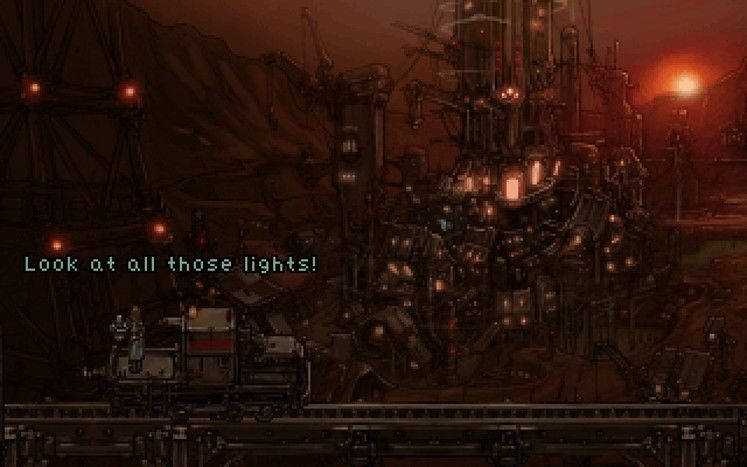It’s the future and everyone and everything is dead. Despite sounding like there shouldn’t be much game at this point the world has instead been inherited by robots. Mankind has passed into the annals of myth, some worshipping him and others denying his existence entirely. Most of the robots inhabit the last remaining cities, such as the supposed utopia of Metropol, while others scavenge a pathetic existence out in the deserts and junk piles of this post-apocalyptic Earth.
 |
| The wastelands are a sea of junk and desert. Not a good place for robots. |
Trying to put together a crashed starship are Horatio Nullbuilt and his floating sarcastic helper Crispin, whose efforts are scuppered when a laser-wielding hovering death machine called Scraper cuts his way into the ship and steals their power core. It’s now up to you to get it back.
While the story’s Macguffin, the elusive power core, stays forever your goal, plenty of side-plots come in to complicate Horatio and Crispin’s plans. While the search begins sensibly – get temporary power running in the ship, attempt to find a replacement, see if anyone else has seen Scraper – it eventually leads to the rusting city of Metropol and a rebellion against the computer ruling the city, the scheming MetroMind. It’s a rather simple story but effectively and powerfully told, and Horatio convincingly gets drawn in to the plot against MetroMind despite really just wanting his power core back.
The writing is excellent throughout, with every robot feeling like an individual. Like every great adventure there are a host of amusing and memorable characters along the way, such as the Maths-loving ex-soldierbot who only speaks in rhyme or the foppish and perpetually arguing Cornelius and Oswald (who has a monocle even though he has no idea what it’s for). While by no means a comedy adventure like Monkey Island there is a definite Sam & Max vibe to Horatio and Crispin, as the classic “long-suffering straight man partnered to the wise-crackin’ short funnyman” duo.
Primordia gets pretty damn hilarious at times, despite the bleak tone, but it’s all “believably” funny rather than the wacky LucasArts/Telltale style. There are no silly situations, just sheer witty lines to crack you up and endear you to the characters. It makes the later events in Metropol a lot harder to take sadly… but no spoilers, of course.
The art is utterly gorgeous throughout, despite being displayed in the faux-‘90s pixellated adventure game style that all WadjetEye titles seem to adopt (but not in any way to their detriment). It may seem drab and brown throughout but that’s part of the charm, and it hides an amazing amount of character. The only downside is that it’s sometimes hard to notice key items, a common failing of the genre sadly but particularly a problem here where things tend to all be the same colour. It’s less a problem with the art however than it is a problem with the engine, since a “highlight all usable objects” button really should be standard in this new age of adventures.
Puzzles, I’m pleased to say, stay taxing but never ridiculous throughout, which is exactly the sweet spot for adventure games. It also has a perfect difficulty curve to boot. Adventure game enthusiasts will be moderately challenged but will otherwise probably fly through most of the first act spent in the Dunes, but the second half in Metropol can be totally brain-stretching.
 |
| The ex-gleaming city of Metropol. |
It’s definitely more difficult than WadjetEye’s last two games, occasionally relying on a half-remembered comment from Horatio a few puzzles earlier. You may have gone round the city, looked at everything and dismissed a few moments as jokes, but they’ll probably turn out to be of vital importance – on the other hand, whole areas and characters can turn out to be worthless.
The puzzling gets two massive thumbs-up from me, as in addition to these points WadjetEye have also instituted non-linear puzzle solving (you often have several to solve at once) and, in a sadly rare move for the genre, alternative puzzle solutions. There are several endings for example, which Resonance hinted at but never went through with, and total failure at one puzzle always yields an alternate but less effective strategy. It’s very cool, and any quibbles I have regarding difficulty can just be written off as me moaning because I couldn’t solve it… although that word puzzle in the information kiosk is still a really annoying one.
I do have to problems to note with the puzzle solving however, or at least how the game encourages you. There are two methods of assistance and neither are particularly helpful. In the first place a click on Crispin will yield a clue, but like the first Hint Coin in a Professor Layton game these are often insultingly obvious. Worse still they only appear once, after which Crispin will merely make fun of you for not being able to solve the puzzle on your own. Secondly the general drop-down interface is bulky, doesn’t show stored important facts very well (you can only see a few words at a time), and trying to use inventory items is more cumbersome than it really needs to be. None of these are game-breakers but they make going through Primordia a bit more annoying than it could’ve been.
 |
| I love Crispin. |
Finally, Primordia is just a little bit short. Promises of properly exploring the city of Metropol are dashed sadly, as several train stations are mentioned but never visited and a crashed bus blocking your access to the rest of the city never gets repaired. The story is completed satisfactorily and doesn’t really feel rushed into a conclusion the way Resonance did, but for anyone looking for a long meaty adventure to get their brain stuck into might be disappointed (especially if you get a “bad” ending).
Unlikely though, because Primordia is a witty, fun, challenging adventure with a marvellous host of likeable characters who are not diminished at all by their lack of a pulse. The difficulty ramps up beautifully, puzzles can have alternate solutions, and all will give your brain a good workout. The story is simple but will keep you gripped as you learn about the world and the fate of humanity (and robonity).
Only a few clunky systems, a couple of irritating puzzles, and a brief playing time let the game down, and none should put you off buying. Between this and Machinarium it seems post-apocalyptic adventures in robot civilisations are a safe bet for excellent puzzling. Well done WadjetEye, that’s another great adventure game to add to your ever-expanding catalogue.
PRIMORDIA VERDICT
Only a few clunky systems, a couple of irritating puzzles, and a brief playing time let the game down, and none should put you off buying. Between this and Machinarium it seems post-apocalyptic adventures in robot civilisations are a safe bet for excellent puzzling. Well done WadjetEye, that’s another great adventure game to add to your ever-expanding catalogue.
TOP GAME MOMENT
Crispin trying to impress a floating female torch-bot by practising chat-up lines on a lamp. Which not only succeeds, but turns out to be vital in the sweetest way possible.




